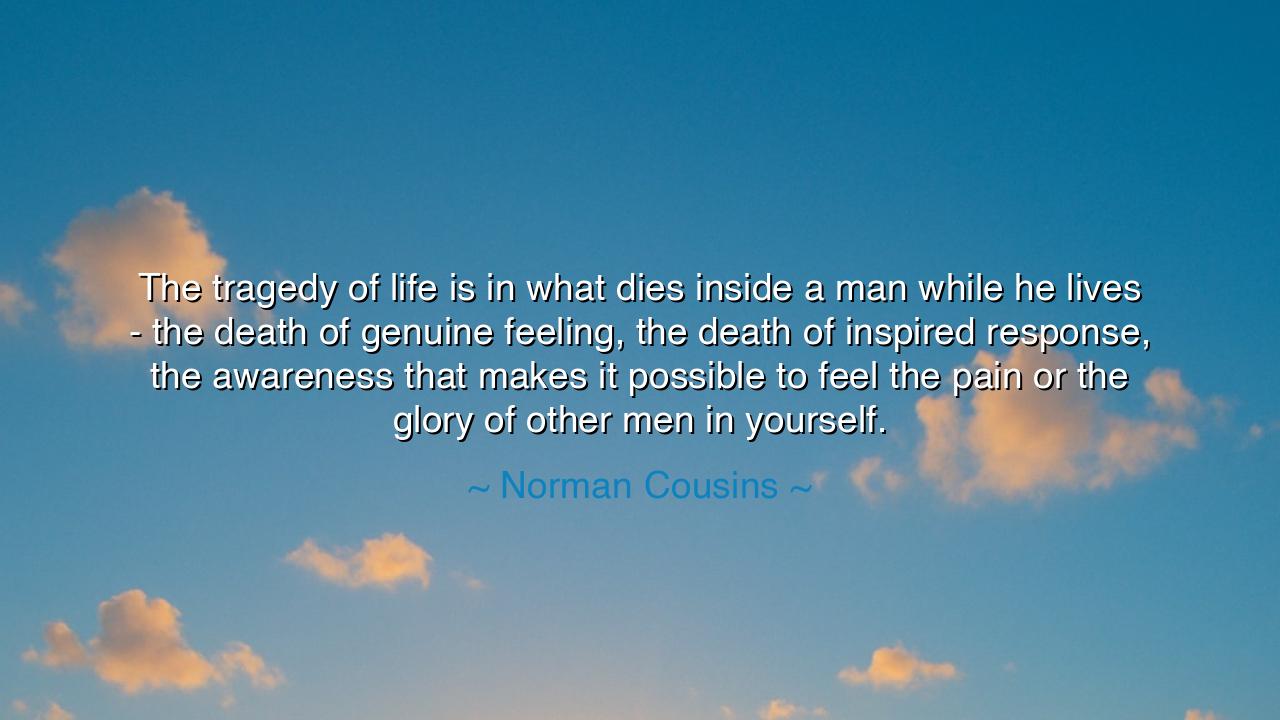
The tragedy of life is in what dies inside a man while he lives -
The tragedy of life is in what dies inside a man while he lives - the death of genuine feeling, the death of inspired response, the awareness that makes it possible to feel the pain or the glory of other men in yourself.






The words of Norman Cousins — “The tragedy of life is in what dies inside a man while he lives — the death of genuine feeling, the death of inspired response, the awareness that makes it possible to feel the pain or the glory of other men in yourself.” — ring like a solemn bell across the ages. They speak not of the death that ends the body, but of the deeper, more sorrowful death that can hollow out the soul long before the final breath is drawn. Cousins, a man of both intellect and compassion, warns that the true tragedy of life lies not in mortality, but in the loss of humanity — when the fire within a person grows cold, when the heart no longer beats in rhythm with the joys and sufferings of others.
In his lifetime, Norman Cousins was known as a journalist, humanitarian, and healer of spirit. He lived through wars and crises, yet his greatest insight came not from the battlefield or the newsroom, but from the quiet chambers of the human heart. He observed how men could walk among the living yet be spiritually dead — souls dulled by apathy, stripped of empathy, incapable of wonder or sorrow. Such a man, Cousins said, no longer truly lives; he merely functions. His body moves, his tongue speaks, but the essence that makes him human — the genuine feeling that binds him to others — has withered.
This death of feeling, Cousins tells us, is the most devastating of all because it spreads unseen. It begins in small ways — the refusal to care, the turning away from another’s pain, the silencing of the voice that cries out for justice. It grows each time we choose comfort over compassion, cynicism over hope. A man who ceases to feel the suffering of others may still possess health, wealth, and power, but he walks in spiritual ruin. For without empathy, the bridge between souls collapses, and with it goes the meaning of life itself.
History offers us many examples of this inner death. Consider the rise of tyranny in any age — how ordinary people, good in the beginning, grew numb to cruelty. During the Holocaust, there were those who looked away as their neighbors were taken, who told themselves it was not their concern. The tragedy was not only in the death of the victims but in the death of compassion among the bystanders. When humanity forgets to feel, evil finds its footing. The concentration camps were built not only by the hands of monsters but by the silence of millions who had let their hearts grow indifferent.
Yet Cousins’s words are not written to condemn, but to awaken. He believed that the human spirit is resilient, that what has died within us can be revived through conscious effort and love. To feel deeply — to rejoice in another’s triumph, to weep for another’s sorrow — is to reclaim one’s own life. The “inspired response” he speaks of is not weakness, but strength; it is the courage to let one’s heart remain open in a world that often seeks to harden it. For only those who risk feeling pain can truly experience the glory of being alive.
Therefore, my children, guard your hearts against numbness. Do not let the world’s coldness extinguish your warmth. When you see suffering, do not turn away; when you witness beauty, let it move you. Speak words that lift, act in ways that heal. Remember that feeling is the breath of the soul — without it, you merely exist, but with it, you live in truth. Compassion, empathy, awe, and gratitude — these are the eternal fires that keep the human spirit from dying before its time.
So let the lesson of Cousins be this: do not fear death of the body — fear the death of the heart. Keep alive within you the capacity to wonder, to grieve, to love, and to rejoice. Tend these sacred flames daily, as the ancients tended their temple fires. When you see injustice, let it stir you to action. When you encounter beauty, let it fill you with reverence. For to feel deeply is to be fully human, and to live with an awakened heart is to triumph over death itself. Thus, the true victory of life is not found in mere survival, but in the preservation of that divine spark — the awareness that makes it possible to feel the pain or the glory of other men in yourself.






AAdministratorAdministrator
Welcome, honored guests. Please leave a comment, we will respond soon